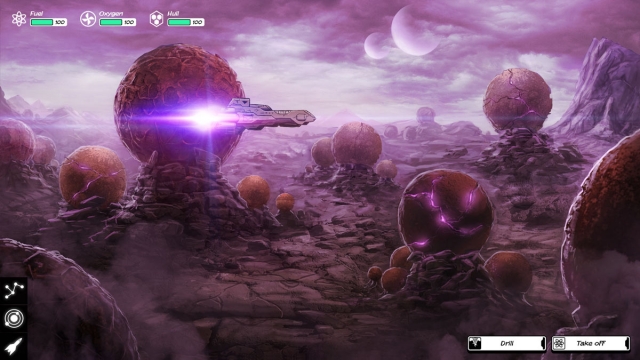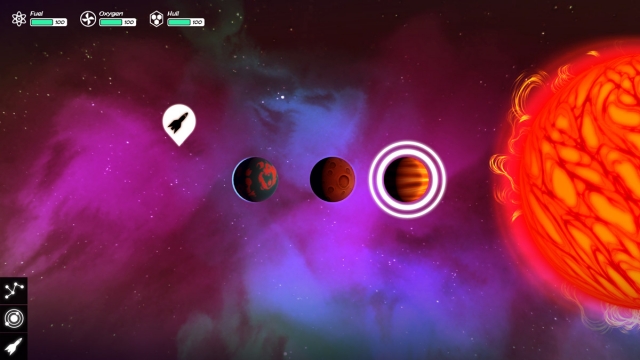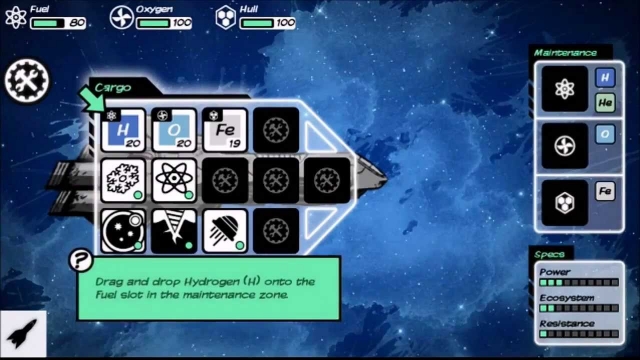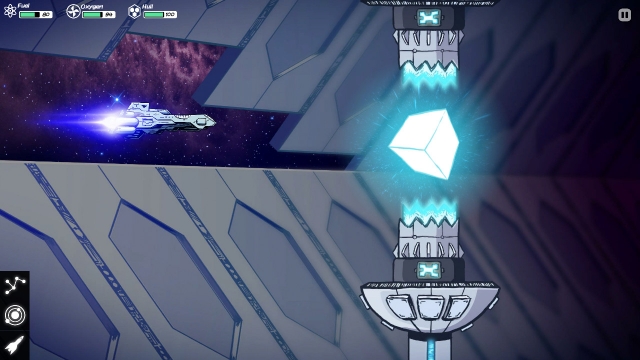Out There Review
Given the complexity of many modern games it’s easy to lose track of what actually makes up the titles we play. Out There feels different in this regard; the systems that drive the game are very much overt - but you’d be mistaken for thinking that’s a bad thing. Space exploration, resource management, risk-reward strategy, divergent storylines, even puzzle-like item arranging. These are the key elements of Out There, and while they technically stand alone within the game, Mi-Clos Studios has done a fantastic job of bringing them all together to create a wonderfully unique experience. It’s one of those games that’s difficult to assign to a certain genre, and when that happens you know it’s either an original and inventive title, or a confused mess. Happily, Out There is very much the former.
The core concept is simple; your player character has ended up in the depths of space after a badly miscalculated cryogenic sleep. So equipped only with your trusty spaceship, you must travel through the galaxy in an effort to survive and maybe even find a way back to Earth. The game follows a strategy-esque viewpoint that swaps between top-down and side-on, with the player choosing locations on a giant universe-wide map, only for this to zoom in on individual star systems once your ship arrives there. Exploration is the name of the game, hopping from system to system in an effort to reach a faraway planet that supposedly holds the secrets for your route back home. So your initial goal is a pleasantly simple one: slowly make your way towards that planet - and don’t die!  Of course, with this being a videogame, obviously means there are plenty of ways to meet your demise. The game uses a resource management system that centres on three core stats: your fuel level, your oxygen level, and the integrity of your hull. Each scored out of 100, if any of them drop to 0 then your journey is at its end. To prevent this from happening you have to hunt down certain elements that will refill the associated resource. Generally, find some Hydrogen, turn it into fuel; Iron can repair your hull; and obviously stored Oxygen can refill your breathable supply. Top up the supplies, and the sounds that accompany the action, eventually become an incredibly satisfying and relieving affair, bringing you one step closer to your goal and a few extra days of survival.
Of course, with this being a videogame, obviously means there are plenty of ways to meet your demise. The game uses a resource management system that centres on three core stats: your fuel level, your oxygen level, and the integrity of your hull. Each scored out of 100, if any of them drop to 0 then your journey is at its end. To prevent this from happening you have to hunt down certain elements that will refill the associated resource. Generally, find some Hydrogen, turn it into fuel; Iron can repair your hull; and obviously stored Oxygen can refill your breathable supply. Top up the supplies, and the sounds that accompany the action, eventually become an incredibly satisfying and relieving affair, bringing you one step closer to your goal and a few extra days of survival.
Of course, just about every action in the game causes you to spend some of at least one of your resources. Want to fly from system to system, that’ll be 20 fuel and 7 oxygen. Want to land on an Iron-rich planet, that’s 10 fuel and 6 oxygen. Even the act of retrieving the elements needed to survive requires fuel. In this way, Out There becomes an incredible balancing act as you try to maximise your ship’s resources while also spending them in the hope of acquiring more. What’s more, there are three core types of planet. Each one helps one of the three resources and not all of them are present in every star system. So spending resources to enter a system is also a huge gamble, as you’ll rarely know what you’ll find within them.
 This mechanic of constant risk taking makes Out There a thrilling experience, but without the need for immediate pressure and stress that most games rely on to achieve that emotion. Getting further and further in the game is a constant test, and while you’re definitely going to die more than a few times, the randomised planets keep things consistently interesting and varied. As mentioned though, the game doesn’t rely on that one core system. What makes it more than a well-constructed survival sim is the inclusion of even deeper, consistently excellent mechanics. Firstly, there’s a great story to be forged within Out There. When moving from system to system the player is presented with a small written story fragment that can range from big multiple choice questions with dramatic results to insignificant, but flavourful anecdotes.
This mechanic of constant risk taking makes Out There a thrilling experience, but without the need for immediate pressure and stress that most games rely on to achieve that emotion. Getting further and further in the game is a constant test, and while you’re definitely going to die more than a few times, the randomised planets keep things consistently interesting and varied. As mentioned though, the game doesn’t rely on that one core system. What makes it more than a well-constructed survival sim is the inclusion of even deeper, consistently excellent mechanics. Firstly, there’s a great story to be forged within Out There. When moving from system to system the player is presented with a small written story fragment that can range from big multiple choice questions with dramatic results to insignificant, but flavourful anecdotes.
These story segments are all wonderfully imaginative, and there are a hell of a lot of them. You’re likely to find some repetition the more you play the game, but it never feels as though you’re traipsing through the same cycle of storylines - each new voyage paints a new picture of your journey and a new part to the protagonist and his lonely adventure. There are also plenty of non-story based decisions to make as well, for instance the cargo mechanic that provides a limited number of slots for the elements needed for survival. Or there’s the possibility of finding one of the several abandoned ships lost in the universe, each with their own different cargo layout, pieces of technology and element requirements for operation.  Technology! That’s yet another system that’s integrated beautifully into the game. The standard techs at the beginning of a venture allow you to do the basic actions - jumping between systems, drilling or probing for elements and scoping out planets. But as your adventure goes on you’ll start to discover more advanced technology that allow you to jump further, absorb more damage from stray dangers (which are usually tied to the story segments), and even do some exciting things like terraform planets into liveable homes where you can refill oxygen. It’s all so cool, and the scope for player agency is just off the charts in almost every aspect of Out There. Certain big AAA games may claim to give the player freedom, but it does always seem to be the smaller titles like this that really deliver on it.
Technology! That’s yet another system that’s integrated beautifully into the game. The standard techs at the beginning of a venture allow you to do the basic actions - jumping between systems, drilling or probing for elements and scoping out planets. But as your adventure goes on you’ll start to discover more advanced technology that allow you to jump further, absorb more damage from stray dangers (which are usually tied to the story segments), and even do some exciting things like terraform planets into liveable homes where you can refill oxygen. It’s all so cool, and the scope for player agency is just off the charts in almost every aspect of Out There. Certain big AAA games may claim to give the player freedom, but it does always seem to be the smaller titles like this that really deliver on it.
There are a couple of issues with the game. For one thing, that reliance on risk and luck does sometimes lead the game into a dark corner - or more specifically, the player into a dark corner of the universe with no real options. Essentially, you’ll often find yourself losing purely because of a streak of seemingly incredible bad luck - at these times it’s hard not to blame to game for not providing enough contingency plans. Yes, it’s how the game is supposed to work, but that doesn’t stop it being frustrating. In fact, difficulty on the whole is a key problem. It’s likely that within your first hour of playing Out There you’ll die several times - put simply, it’s too easy to die.
 That sounds like a stupid complaint, especially now amidst the Bloodborne hoopla, but the fact that it’s easy to die early on in a game really upsets the pace. It would be great to play the first couple of games for an hour or more each, discovering new places, learning the game step by step and exploring everything for the first time. Yet when you die 15 minutes into your first run and every few after that, it takes away from the awe of that initial jump into the universe. It also means that by the time you’re good at the game, and getting further and further into the star systems, you’re likely to have seen and read just about everything the game has to offer. Imagine how much more enjoyable it would have been if you could grow, learn and get further into the game without having to continuously restart.
That sounds like a stupid complaint, especially now amidst the Bloodborne hoopla, but the fact that it’s easy to die early on in a game really upsets the pace. It would be great to play the first couple of games for an hour or more each, discovering new places, learning the game step by step and exploring everything for the first time. Yet when you die 15 minutes into your first run and every few after that, it takes away from the awe of that initial jump into the universe. It also means that by the time you’re good at the game, and getting further and further into the star systems, you’re likely to have seen and read just about everything the game has to offer. Imagine how much more enjoyable it would have been if you could grow, learn and get further into the game without having to continuously restart.
Although the tough difficulty does make the game more replayable (and suits the mobile style if you buy the game on that platform), it’s tough not to wish there was a scalable difficulty level so that the player can enjoy the tale of their protagonist right from the first game. Still, Out There is fantastic despite this flaw. It’s a beautiful game too, with a comic-esque art style that perfectly matches the sci-fi setting. In fact, the game has so many fantastic little mechanics, it’s a wonder how Mi-Clos Studios has managed to combine them so effectively. The version tested for this review was on PC, and on that platform it was a great title for a bit of relaxed, but thoughtful, gaming. It’s a great example of how several small ideas can become an orchestra of brilliance. If only it wasn’t so difficult.
Out There: Ω Edition (Reviewed on Windows)
This game is great, with minimal or no negatives.
The version tested for this review was on PC, and on that platform it was a great title for a bit of relaxed, but thoughtful, gaming. It’s a great example of how several small ideas can become an orchestra of brilliance. If only it wasn’t so difficult.











COMMENTS